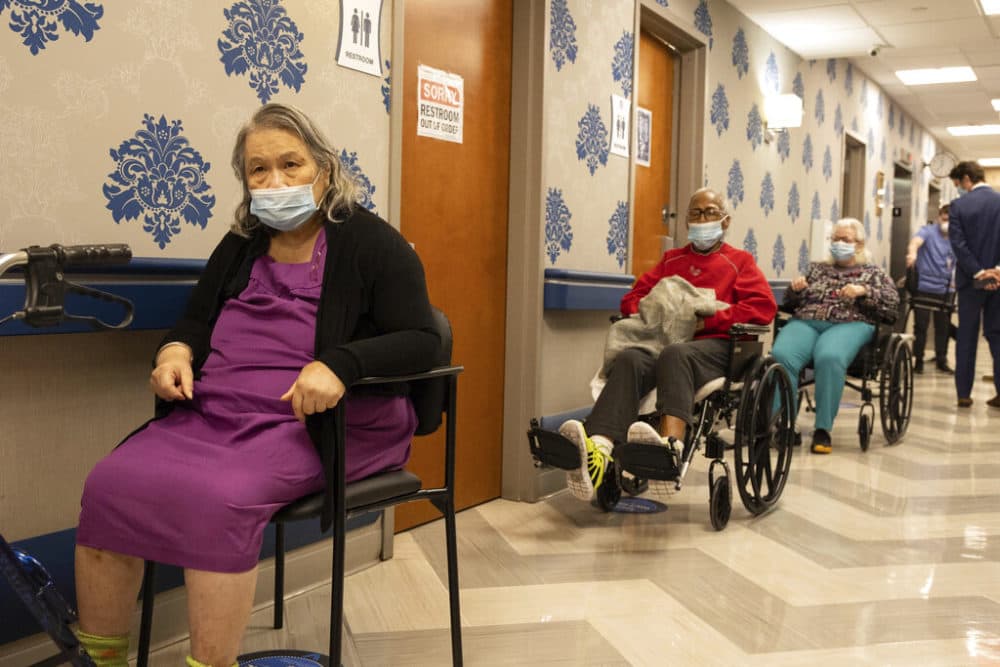Advertisement
On Point's Coronavirus Hours
Rethinking How We Approach Long-Term Care In The U.S.
Resume
Nursing homes in crisis. Is it time to rethink how they work? We talk about alternative models for nursing homes and how to build a better long-term care system in the U.S.
Guests
Katie Smith Sloan, CEO of LeadingAge, the association of nonprofit aging services, including nursing homes. (@SmithSloan)
Jack Beatty, On Point news analyst. (@JackBeattyNPR)
Howard Gleckman, senior fellow at Urban-Brookings Tax Policy Center at the Urban Institute. Author of "Caring for Our Parents." (@howard_gleckman)
Also Featured
Sandy Isham, registered nurse in Kansas who pulled her mother out of a nursing home during the pandemic.
Stephanie Igoe, former administrator at the Hallworth House, a non-profit nursing home in Providence, Rhode Island that closed in August 2020.
Interview Highlights
The American Health Care Association says that nursing homes could lose some 34 billion dollars over the next couple of years. And 10 times as many nursing homes, perhaps as many as 2,000 or almost 2,000, could close this year. Do those numbers make sense to you?
Katie Smith Sloan: ”I would characterize the nursing home sector right now as fragile. You know, nursing homes have been through a war over the last year. Early on in COVID they were ignored by the feds, even though we knew well that older people and those with underlying health conditions were most at risk. Nursing homes lacked PPE, they lacked access to testing, and they had to scrape and scramble to keep their residents and staff safe. And the truth is, when there were high rates of coronavirus in the community, there was COVID in nursing homes. Because staff come and go, three shifts a day.
“So as long as communities were not taking measures to control spread, sadly, nursing homes could not avoid COVID. So we were extremely relieved when CDC prioritized nursing homes for vaccines through the pharmacy partnership program. You know, by mid-March of this year, just a few weeks from now, all homes will have had their third and last clinic, which means that like 80 to 90% of residents will have been vaccinated. And finally, this is an acknowledgment that older lives are not expendable.”
We reached out to the American Health Care Association, an industry group that represents some 14,000 operators. And in the statement they gave back to us, I think a half a dozen times, they said Medicaid has been notoriously underfunding nursing homes for years. Is that part of the problem?
Katie Smith Sloan: "It's absolutely part of the problem. We need to invest in paying homes for the cost of care, not some arbitrary and unrelated amount that falls woefully short of what it actually costs to care for people with complex medical conditions. And a lot of the expense that Medicaid covers is staffing. And we need to invest in these jobs. We need to pay our direct care workers a livable wage, and professionalize the work that they do. So it does come back to what we value as a country. And do we value quality care for older adults? And if so, knowing that Medicaid is the primary payer, we need to invest more in our Medicaid programs."
So should it be the primary payer?
Katie Smith Sloan: "Families impoverish themselves and spend down in order to be able to access long-term care through the Medicaid program. From our perspective ... we need to completely rethink how we pay for long-term care in this country. So families' pocketbooks don't become the deductible for Medicaid, which they are now.
"We need to think about long-term care, not as just nursing home care, but long-term care includes home health care. It includes hospice. It includes assisted living. It includes the full panoply of services and supports. Because everybody's aging journey is different, everybody needs different services at different times. But ultimately, over half the older population will need to access some form of long-term care. So we need to think about the system of long-term care and how we are going to support it so people can get the best services they need wherever they call home."
On solutions for the nursing home industry
Howard Gleckman: "While everyone focuses on nursing homes and this show is focused on nursing homes, it's important to keep in mind that already the vast majority of people who get long-term care in the United States get it at home. Probably only 10% of people who receive long-term care receive it at [nursing homes], and maybe another 5% or 10% get it in assisted living. This is a home care world for the most part.
"But we do have to focus on how we can get people who are currently now living in nursing homes, primarily because that's where Medicaid pays. People are driven to nursing homes by the Medicaid payment system. If you need long-term care, Medicaid will pay for your room and board in a nursing home. It will not pay for it anywhere else. So that's an incentive for people to use nursing homes.
"So the first thing we need to do is we need to think about how we can take people who are in nursing homes only because that's where Medicaid puts them, and we need to get them at home. Then we need to think about all those people who are not on Medicaid. Again, many more people not on Medicaid who receive long-term care.
"These are middle income people. People who are teachers over the course of their lives, are computer technicians. Who unfortunately got the wrong disease when they got old and ended up struggling to try to find a way to pay for their long-term care. We need to figure out some way to pay for their care. Most countries in the world, with the exception of the United States and England, have a social insurance program to pay for health care. We don't. We should."
Where would you look to as positive counterexamples?
Howard Gleckman: "Every other developed country in the world, Germany, France, Israel, Singapore, have all developed a social insurance program. We've recommended — I worked with a group a few years ago that recommended a public catastrophic long-term care insurance program. Essentially, people who had a catastrophic need for care after a year or two would get a public benefit. We pay them in cash and they could decide themselves where they wanted to get their care."
And that's not based on income like Medicaid is?
Howard Gleckman: "That's correct. It would be just like Social Security. You would pay a tax. You pay a premium over the course of your working life. And in return for that, you get a cash benefit as you became a high-level need for care. It is what every other country in the world does. There's no reason why we couldn't do it."
Could we actually have a future where people doing care at home could get paid through this kind of expanded social insurance?
Howard Gleckman: "For example, in the German program, which has been around for decades, you get a cash benefit and you can use that cash benefit to do whatever you want, including paying your neighbors, paying your cousin. ... You could use that money to pay for somebody to provide care. That's the very nice thing about this kind of an insurance model. It gets it away from the system we have now where ... nursing homes and even many home care agencies, essentially, they're government contractors.
"They're like the defense industry. These industries live based on their government contracts. So Jack was talking before about the lobbyists that they all have. Well, of course they have lobbyists because all their money is coming from the government. So what you want to do is you want to create a system where the money is not coming so much from the government, but it's actually coming from people's own pockets. That way they get to decide themselves what the best form of care is.
"Maybe they have a care manager who helps them, but they get to decide what the best form of care is and everybody's happier. One other point about this. There is some evidence that if you provide good quality, long-term care to people, with quality social supports to people living at home, that their health care costs will go down, they're much less likely to go to emergency department, they're much less likely to have a hospital stay. So some of the cost of having a well functioning long-term care system is actually offset by lower spending on the health care side. So this is not necessarily a zero sum game."
From The Reading List
Wall Street Journal: "Covid Spurs Families to Shun Nursing Homes, a Shift That Appears Long Lasting" — "The pandemic is reshaping the way Americans care for their elderly, prompting family decisions to avoid nursing homes and keep loved ones in their own homes for rehabilitation and other care."
The 19th: "Most nursing homes say they won’t be able to stay open another year due to pandemic costs" — "The United States recorded its first COVID-19 death in February 2020 as the virus swept through a Washington nursing home. Within one year, the country has reported more than 136,000 coronavirus deaths linked to long-term care facilities — more than one-third of all coronavirus deaths in the country. Now, the nursing home industry faces a financial crisis."
New York Times: "Nursing Homes, Once Hotspots, Far Outpace U.S. in Covid Declines" — "Throughout the pandemic, there has been perhaps nowhere more dangerous than a nursing home. The coronavirus has raced through some 31,000 long-term care facilities in the United States, killing more than 163,000 residents and employees and accounting for more than a third of all virus deaths since the late spring."
Tampa Bay Times: "How to fix the nursing home crisis, now and after the pandemic" — "The COVID-19 pandemic has caused tens of thousands of deaths and more than three million infections, with predictions of many more to come. Nursing home residents have been among the most affected by the pandemic."
This program aired on March 1, 2021.

